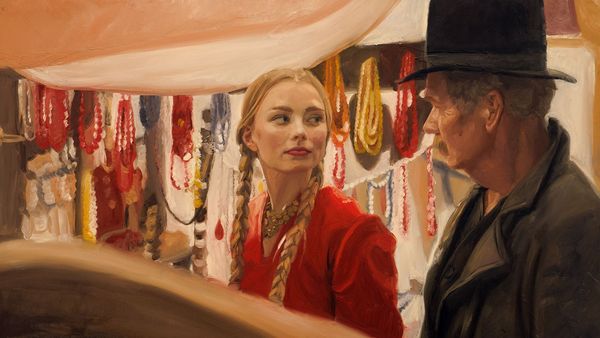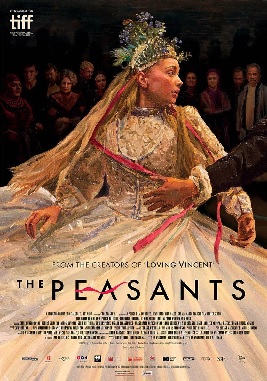Eye For Film >> Movies >> The Peasants (2023) Film Review
The Peasants
Reviewed by: Jennie Kermode

Interrupted by a serious accident and all manner of other unexpected inconveniences, Władysław Reymont’s celebrated novel, The Peasants, took seven years to write. Interrupted by a war, Hugh Welchman and DK Welchman’s adaptation took five years to film, and it could easily have been more had the two directors (who are also a couple) not accepted the need for compromise. If you’re familiar with their names, that’s likely due to the success of 2018 Oscar nominee and European Film Award winner Loving Vincent, every one of whose 56,000 frames was hand-painted in oils. A similar number of frames were painted this time around, but in places digitally drawn images were used in between them. It doesn’t really show. The result is a feast for the eyes.
Just as Reymont’s book immersed itself in the metaphorical colour of Polish peasant life, so the Welchmans’ film delivers a flood of literal colour, with red-dyed garments, ribbons, floral motifs, painted eggs and, of course, the golden braids of its central character, Jagna (played by Kamila Urzedowska, who, along with her co-stars, was rotoscoped to form the basis for the paintings). With subplots necessarily reduced to achieve a runtime of just under two hours, she is in almost every scene, and Urzedowska’s distinctive interpretation makes her a significantly more sympathetic figure. Whilst this reduces the nuance in the tale, it arguably makes it more palatable for a present day audience, and the key folkloric aspects of the whole remain intact.

Jagna is one of those women unlucky enough to be beautiful in an environment where any form of female power over men is not tolerated. To make it worse, she is ambitious, longing for something more than the peasant’s traditional lot. These two qualities fascinate a series of men who, when she’s young and naïve, provide welcome distractions, but who inevitably go on to bore her. Though her concerned parents endeavour to remove her from the fray by marrying her off to comparatively wealthy farmer Maciej (Miroslaw Baka), telling her “love comes and goes but land stays,” she still has to deal with the resentment of the men who continue to desire her – not least Maciej’s two sons – as well as that of one of their wives.
The wife, Hanka (Sonia Mietielica), is also a sympathetic figure in many ways, devoted to her husband and father-in-law, and though she becomes vicious in her treatment of Jagna, her behaviour makes sense in context. She doesn’t share her rival’s beauty, so the only weapon available to her – and the only framework through which she can interpret the situation – is the traditional morality of the villagers. That she doesn’t even question the misogyny of this speaks to the tragedy of her own situation as much as Janka’s.
Whilst all this is going on, the film also addresses the land dispute between the peasants and a local nobleman over neighbouring woodland, a theme which enables the directors to demonstrate how romanticised peasant resistance and intra-community cruelty often stem from the same place. There are some ambitious action scenes here which, like the dancing scene at Jagna’s wedding, presented a considerable challenge to the hundred-strong painting team. The Welchmans have a deep understanding of European artistic traditions contemporary with the novel and use their language of symbolism and allusion to add an extra layer of content as they bring these scenes to life.
In sum, The Peasants is a film which can be enjoyed on multiple levels, whether you simply follow the story, engage with the characters, let yourself get carried away by the beauty of it all or simply gape in awe at the effort that has gone into it and the technical skill involved. One is reminded of Peter Greenaway’s efforts to create film as a living version of a painting, though he never took it this far. Whatever it ultimately means to you, this film is indisputably a work of art.
Reviewed on: 08 Dec 2023
















